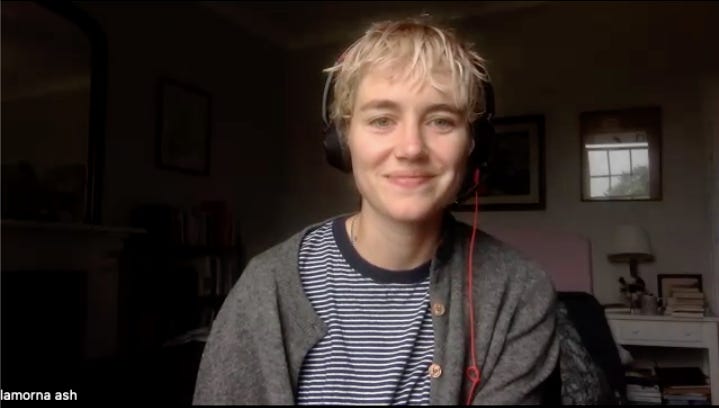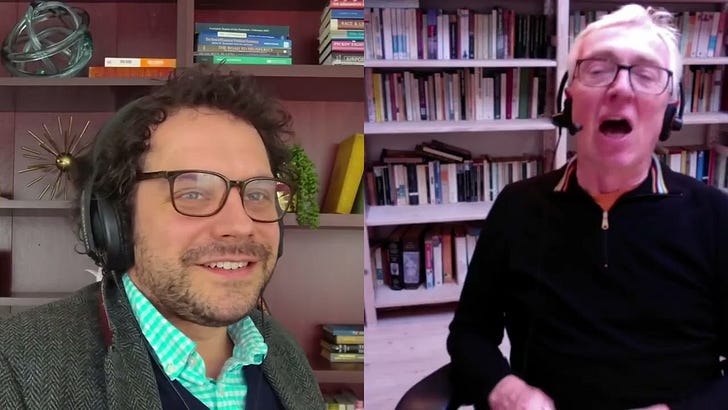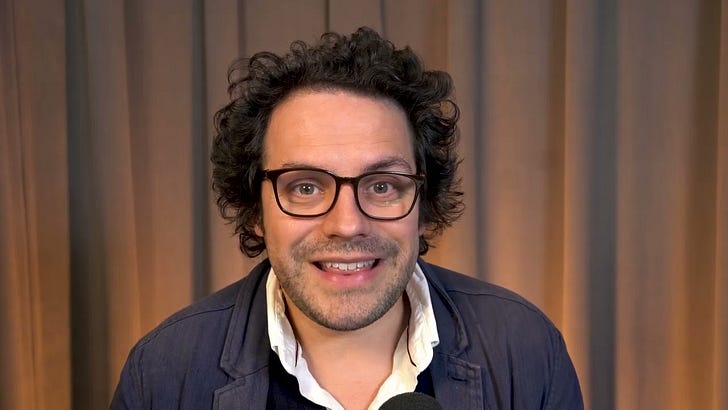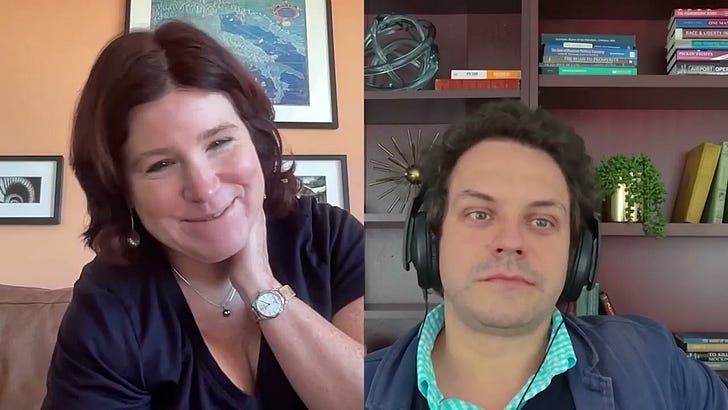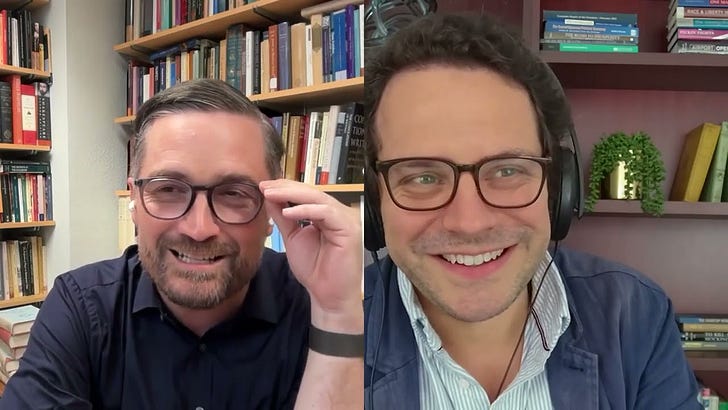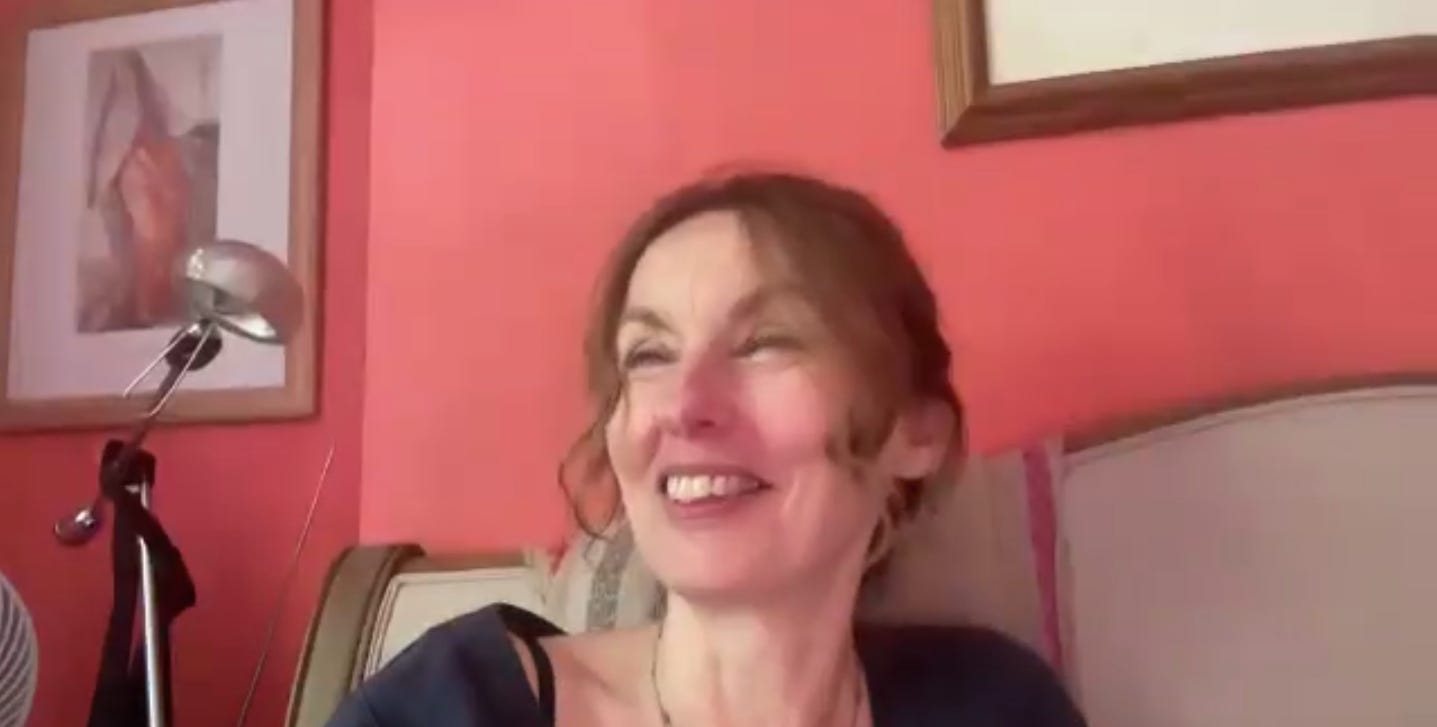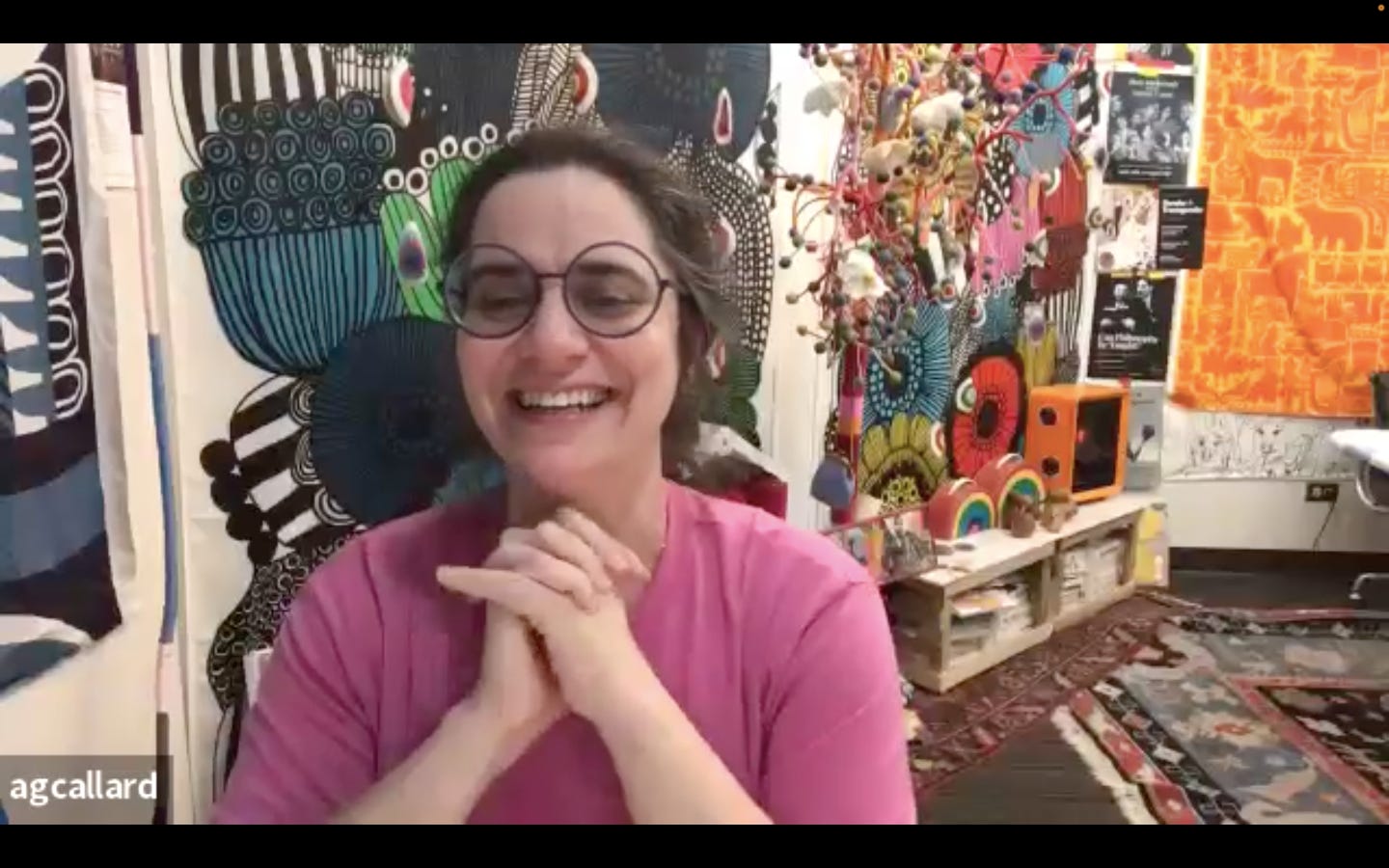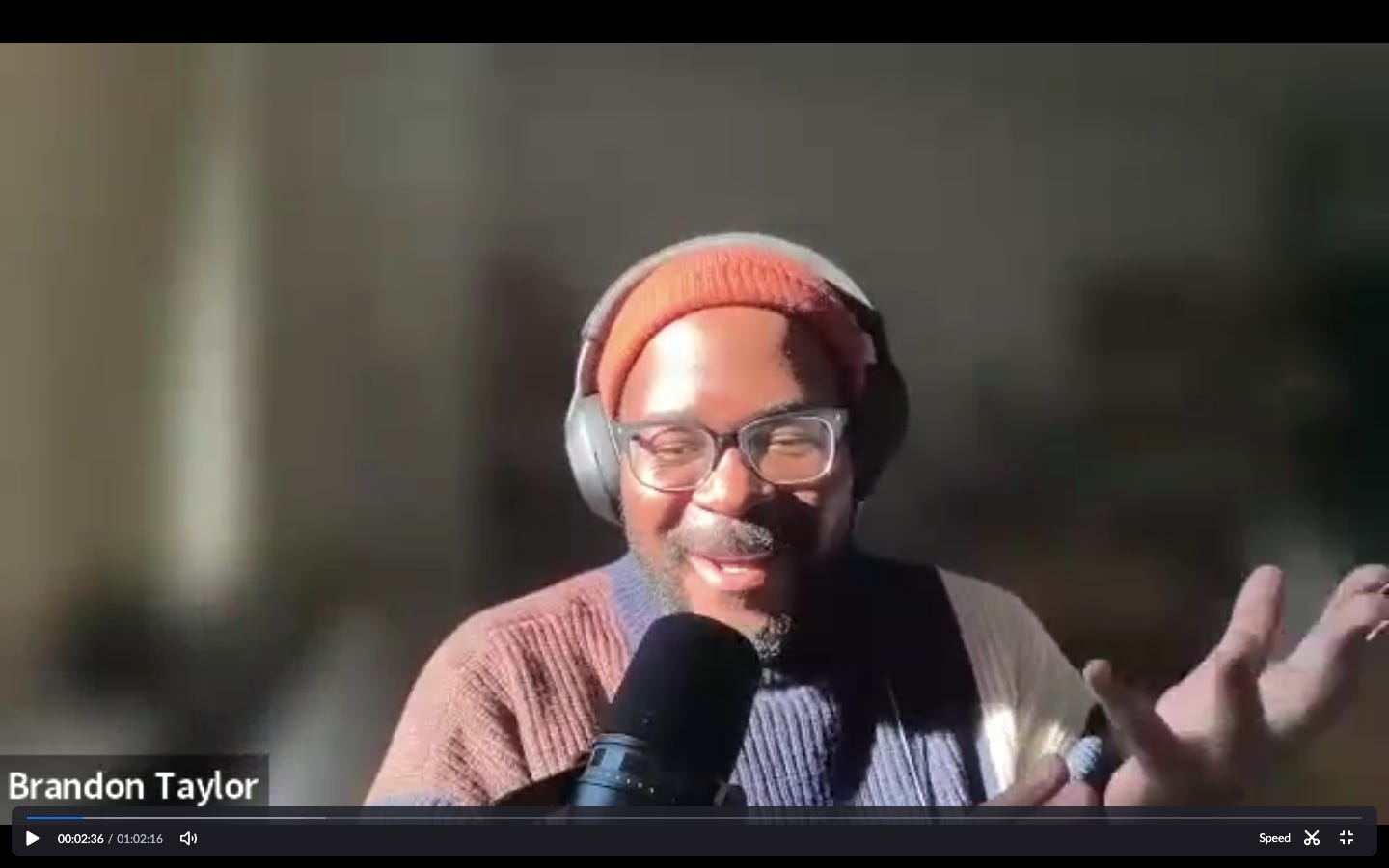Lamorna Ash. Don't Forget We're Here Forever
Description
In this interview, Lamorna Ash, author of Don’t Forget We’re Here Forever: A New Generation's Search for Religion, and one of my favourite modern writers, talked about working at the Times Literary Supplement, netball, M. John Harrison, AI and the future of religion, why we should be suspicious of therapy, the Anatomy of Melancholy, the future of writing, what surprised her in the Bible, the Simpsons, the joy of Reddit, the new Pope, Harold Bloom, New Atheism’s mistakes, reading J.S. Mill. I have already recommended her new book Don’t Forget We’re Here Forever, which Lamorna reads aloud from at the end. Full transcript below.
Uploading videos onto Substack is too complicated for me (it affects podcast downloads somehow, and the instructions to avoid this problem are complicated, so I have stopped doing it), and to upload to YouTube I have to verify my account but they told me that after I tried to upload it and my phone is dead, so… here is the video embedded on this page.
I could quote the whole thing. Here’s one good section.
Lamorna: Which one would you say I should do first after The Sea, The Sea?
Henry: Maybe The Black Prince.
Lamorna: The Black Prince. Great.
Henry: Which is the one she wrote before The Sea, The Sea and is just a massive masterpiece.
Lamorna: I'll read it. Where do you stand on therapy? Do you have a position?
Henry: I think on net, it might be a bad thing, even if it is individually useful for people.
Lamorna: Why is that?
Henry: [laughs] I didn't expect to have to answer the question. Basically two reasons. I think it doesn't take enough account of the moral aspect of the decisions being made very often. This is all very anecdotal and you can find yourself feeling better in the short term, but not necessarily in the long-- If you make a decision that's not outrageously immoral, but which has not had enough weight placed on the moral considerations.
There was an article about how lots of people cut out relatives now and the role that therapy plays in that. What I was struck by in the article that was-- Obviously, a lot of those people are justified and their relatives have been abusive or nasty, of course, but there are a lot of cases where you were like, "Well, this is a long-term decision that's been made on a short-term basis." I think in 10 years people may feel very differently. There wasn't enough consideration in the article, at least I felt, given to how any children involved would be affected later on. I think it's a good thing and a bad thing.
Lamorna: I'm so with you. I think that's why, because also the fact of it being so private and it being about the individual, and I think, again, there are certain things if you're really struggling with that, it's helpful for, but I think I'm always more into the idea of communal things, like AAA and NA, which obviously a very particular. Something about doing that together, that it's collaborative and therefore there is someone else in the room if you say, "I want to cut out my parent."
There's someone else who said that happened to me and it was really hard. It means that you are making those decisions together a little bit more. Therapy, I can feel that in friends and stuff that it does make us, even more, think that we are these bounded individuals when we're not.
Henry: I should say, I have known people who've gone to therapy and it's worked really well.
Lamorna: I'm doing therapy right now and it is good.
Transcript
Henry: Today I am talking to Lamorna Ash. Lamorna is one of the rising stars of her generation. She has written a book about a fishing village in Cornwall. She's written columns for the New Statesman, of which I'm a great admirer. She works for a publisher and now she's written a book called, Don't Forget, We're Here Forever: A New Generation's Search for Religion. I found this book really compelling and I hope you will go and read it right now. Lamorna, welcome.
Lamorna Ash: Thank you for having me.
Henry: What was it like when you worked at the Times Literary Supplement?
Lamorna: It was an amazing introduction to mostly contemporary fiction, but also so many other forms of writing I didn't know about. I went there, I actually wrote a letter, handwritten letter after my finals, saying that I'd really enjoyed this particular piece that somehow linked the anatomy of melancholy to infinite jest, and being deeply, deeply, deeply pretentious, those were my two favorite books. I thought, well, I'll apply for this magazine. I turned up there as an intern. They happened to have a space going.
My job was Christmas in that I just spent my entire time unwrapping books and putting them out for editors to swoop by and take away. I'd take on people's corrections. I'd start to see how the editorial process worked. I started reading. I somehow had missed contemporary fiction. I hadn't read people like Rachel Kask or Nausgaard. I was reading them through going to the fiction pages. It made me very excited. Also, my other job whilst I was there, was I had the queries email. You'd get loads of incredibly random emails, including things like, you are cordially invited to go on the Joseph Conrad cycle tour of London. I'd ask the office, "Does anyone want to do this?" Obviously, no one ever said yes.
I had this amazing year of doing really weird stuff, like going on Joseph Conrad cycling tour or going to a big talk at the comic book museum or the new advertising museum of London. I loved it. I really loved it.
Henry: What was the Joseph Conrad cycling tour of London like? That sounds-
Lamorna: Oh, it was so good. I remember at one point we stopped on maybe it was Blackfriars Bridge or perhaps it was Tower Bridge and just read a passage from the secret agent about the boats passing underneath. Then we'd go to parts of the docks where they believe that Conrad stayed for a while, but instead it would be some fancy youth hostel instead.
It was run by the Polish Society of London, I believe-- the Polish Society of England, I believe. Again, each time it was like an excuse then to get into that writer and then write a little piece about it for the TLS. I guess, it was also, I was slightly cutting my teeth on how to do that kind of journalism as well.
Henry: What do you like about The Anatomy of Melancholy?
Lamorna: Almost everything. I think the prologue, Democritus Junior to the Reader is just so much fun and naughty. He says, "I'm writing about melancholy in order to try and avoid melancholy myself." There's six editions of it. He spent basically his entire life writing this book. When he made new additions to the book, rather than adding another chapter, he would often be making insertions within sentences themselves, so it becomes more and more bloated. There's something about the, what's the word for it, the ambition that I find so remarkable of every single possible version of melancholy they could talk about.
Then, maybe my favorite bit, and I think about this as a writer a lot, is there's a bit called the digression of air, or perhaps it's digression on the air, where he just suddenly takes the reader soaring upwards to think about air and you sort of travel up like a hawk. It's this sort of breathing moment for a reader where you go in a slightly different direction. I think in my own writing, I always think about digression as this really valuable bit of nonfiction, this sense of, I'm not just taking you straight the way along. I think it'd be useful to go sideways a bit too.
Henry: That was Samuel Johnson's favorite book as well. It's a good choice.
Lamorna: Was it?
Henry: Yes. He said that it was the only book that would get him out of bed in the morning.
Lamorna: Really?
Henry: Because he was obviously quite depressive. I think he found it useful as well as entertaining, as it were. Should netball be an Olympic sport?
Lamorna: [laughs] Oh, it's already going to be my favorite interview. I think the reason it isn't an Olympic-- yes, I have a vested interest in netball and I play netball once a week. I'm not very good, but I am very enthusiastic because it's only played mostly in the Commonwealth. It was invented a year after basketball as a woman-friendly version because women should not run with the ball in case they get overexerted and we shouldn

